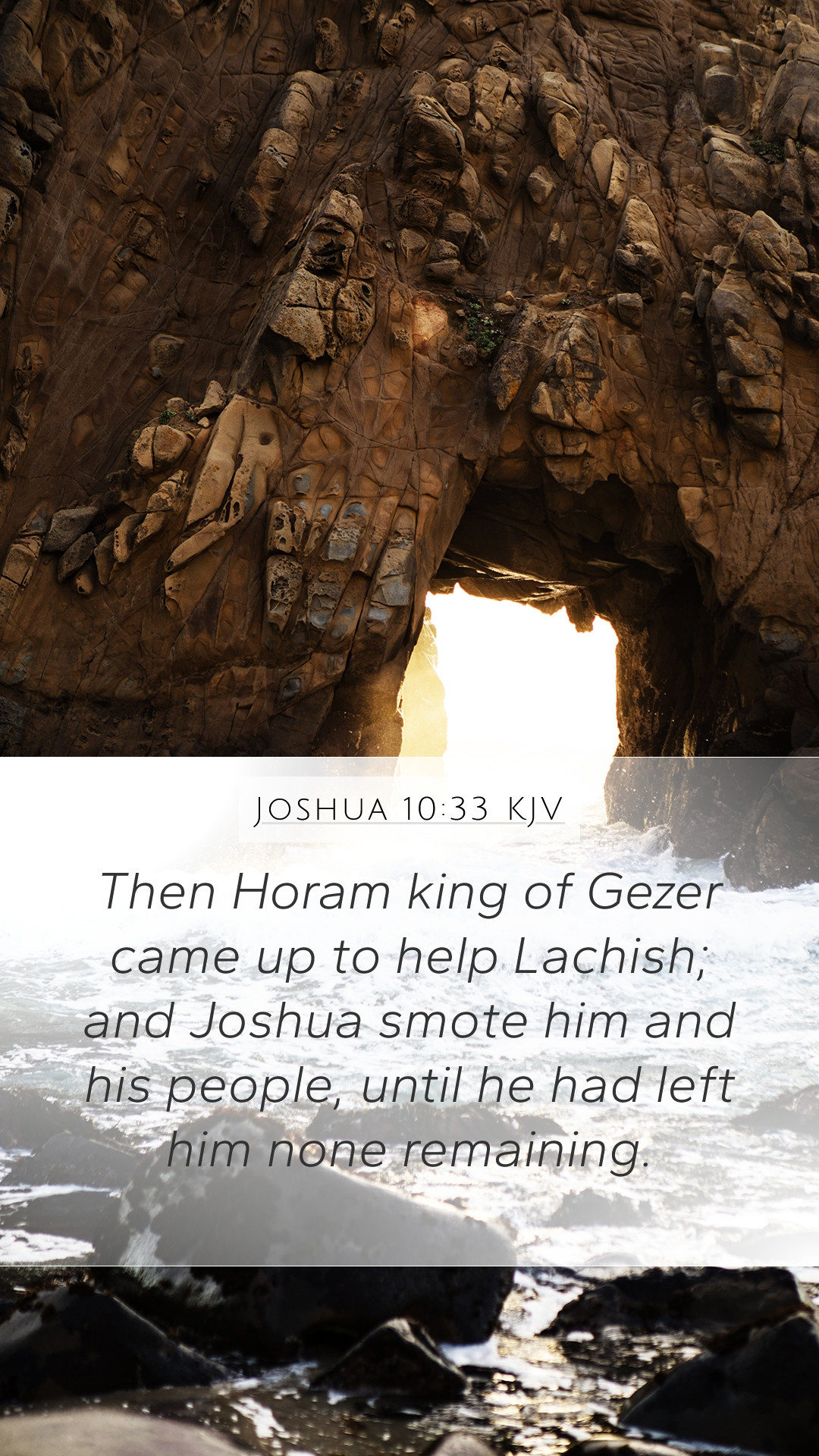Bible Verse Commentary: Joshua 10:33
Verse: "Then Horam king of Gezer came up to help Lachish; and Joshua smote him and his people, until he left him none remaining."
Understanding the Context
In this passage from Joshua 10:33, we see the culmination of Joshua's military campaigns as the Israelites, under his leadership, confront various kings in the promised land. The historical context is pivotal to understanding this verse and its implications within the grand narrative of Scripture.
Verse Analysis
The verse depicts the attack on the city of Lachish, which was fortified and posed a significant challenge to the Israelites. The intervention of Horam, the king of Gezer, illustrates a coalition of Canaanite cities against Israel. This verse is significant in understanding the overarching theme of divine assistance and providence in Israel’s conquests.
Insights from Public Domain Commentaries
-
Matthew Henry:
Henry emphasizes the sovereignty of God in the success of Joshua's military endeavors. He notes that God had promised to deliver the land to Israel and that every enemy defeated was a sign of God's faithfulness to His covenant people. The smiting of Horam and his forces showcases both the might of Israel under divine guidance and serves as a warning to other nations of the consequences of opposing God's chosen people.
-
Albert Barnes:
Barnes highlights the role of Horam as an example of the futility of allied forces against the will of God. He interprets this confrontation as a testament to the inevitable victory of God’s plans, where unified efforts against divine purpose are met with failure. Barnes also points out the significance of names and places in Hebrew narratives, which further enriches our understanding of their historical journeys.
-
Adam Clarke:
Clarke provides a detailed examination of Lachish and Gezer's locations, analyzing their geographic and military significance. He remarks that the persistent warfare during this time illustrates the challenging process of claiming the promised land. Clarke's interpretation underscores that the events serve not only as historical records but also as lessons on the perseverance and faithfulness required in spiritual endeavors.
Key Themes
The central themes derived from Joshua 10:33 include:
- Divine Sovereignty: The passage conveys that the outcomes of human strife are under God's control, affirming His sovereignty over history.
- Covenant Fulfillment: God’s promises to Israel are central, as every victory is another step towards fulfilling the covenant made with their ancestors.
- Human Agency: Joshua and the Israelites display courage and tactical prowess, indicating that God works through human actions and decisions.
- Judgment and Mercy: This verse reflects the broader theme of God’s judgment against nations that oppose Him while simultaneously demonstrating mercy toward His people.
Applications for Bible Study
Understanding this verse can deepen one's insight into the complexities of biblical narratives. Here are a few applications:
- Consider how God’s historical interventions shape current faith perspectives.
- Reflect on the role of alliances and antagonisms in our lives, and how God may use situations for His purposes.
- Engage in discussions within bible study groups to explore themes of conflict, divine purpose, and the significance of faith during trials.
- Utilize bible study tools to gain additional insights, such as maps and timelines, which contextualize the events described.
Cross References
Here are relevant cross-references that can enrich understanding of Joshua 10:33:
- Deuteronomy 20:1-4: God's assurance of victory for Israel in battles.
- Numbers 14:9: The command to not fear the enemies because God is with them.
- Joshua 10:24-25: Joshua encourages his leaders not to fear those they conquer.
Conclusion
The battle described in Joshua 10:33 serves as a powerful reminder of God’s control over history and His ability to bring about His will through His people. Engaging with this verse through various commentaries provides deeper bible verse understanding and opens pathways for spiritual application in our lives today. By studying Scripture in this way, we not only gain knowledge but also grow in faith and obedience to God's purposes.
Further Study Suggestions
For those interested in deeper investigations, consider exploring:
- Understanding difficult Bible passages through group discussions or online platforms.
- In-depth Bible verse analysis through dedicated study guides and courses.
- Examine Old Testament prophecy interpretations that may relate to this historical narrative.


